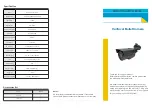
BUCKINGHAM MFG.
BUCKINGHAM LADDER LOCK SYSTEM
MODEL 355B / 355BG9
–
BOTTOM STRAP
Ladder Lock Systems provide a ladder safety solution that includes ladder stabilizing straps and the convenience
of storing the straps on the ladder.
Note: Material color may vary from that shown.
The Buckingham Ladder Lock System is a combination of a ladder stabilizing strap and a redi-access storage bag
that is attached to the ladder. The bottom stabilizing strap is used on poles; it can also be used on trees, to aid in
stabilizing the bottom of an extension ladder to prevent kick-out and excessive rocking. The redi-access storage
bag for the strap is designed to be attached between the two lower rungs, first and second rungs from the bottom,
on the base section of the extension ladder. See Fig. 1. Proper setup of your ladder and use of these straps will
aid in your compliance to applicable OSHA Regulations.
NOTES:
This product cannot thoroughly secure the ladder unless the top of the ladder, depending on the
circumstance, is also secured, see Buckingham Model 355T. The strap is not
intended to compensate for poor or
uneven footing or an improper climbing angle. Loose or soft footing could cause the securement straps to loosen if
the ladder settles. To aid in preventing this potential, a recommendation such as placing on a flat firm surface such
as an outrigger pad to distribute the weight could be used. In any case, all ladder manufacturers recommendations,
cautions and warnings as well as applicable OSHA regulations must be followed.
Components of the Ladder Lock System
The strap is constructed of 1-inch wide webbing with a slip-through cam buckle, a snap-hook and D-ring on each
end of the strap. The snap hooks and D-rings are used to secure the ends of the strap around each side rail of the
ladder and the cam buckle is used to tighten and secure the strap in place.
The redi-access storage bag is made of water-resistant material with a
hook and loop fastener
opening. The two
upper corner straps each have a plastic friction buckle and the two bottom corner straps have quick connect
buckles.
The quick connect buckles are there to enable the bag to be moved so the strap can be removed more easily.
When the extension ladder is against the pole at the proper climbing angle, the bag too is also at an angle. By
disconnecting the quick connect buckles, the bag will fall to a more vertical angle making it easier to remove the
stabilizing strap from inside. This is not a necessity, just a convenience if preferred.
Installation of the redi-access storage bag
The bag is mounted with the hook and loop opening facing the pole, making the enclosed
strap readily available so the technician can pull the strap out directly toward the pole.
With the ladder set at the proper climbing angle on the pole and the Hook and loop opening
facing the pole, attach the two upper corner straps to the second rung from the bottom on
the base section of the ladder. Snug up close to the bottom edge of the rung using the
plastic buckles.
Now adjust the length of the two lower straps and loop around the next rung down, the first
rung from the bottom, and snap the quick connect buckles together. Then, pull on the
loose end of the straps to tighten.
All four straps should be as close to the side rails as possible and tight (See Fig. 2).
The bottom redi-access storage bag is now ready for use. It stays attached to the ladder
during storage
on the truck’s ladder rack, tran
sportation and use. The quick connect
buckles are there to enable the bag to be moved so the strap can be removed more easily.
When the extension ladder is against the pole at the proper climbing angle, the bag is also
at an angle. By disconnecting the quick connect buckles, the bag will fall to a more vertical
angle making it easier to remove the stabilizing strap from inside.
355B.doc (Rev 05/08/19
Fig. 2
Fig. 1
Fig. 3




















